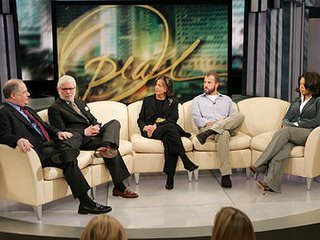More on Win-Frey
(photo from oprah.com)
 Over at Huffington Post they're hotly debating the James Frey on Oprah moment. Who knew I was watching a moment of pop cultural history last Thursday!
Over at Huffington Post they're hotly debating the James Frey on Oprah moment. Who knew I was watching a moment of pop cultural history last Thursday!This commenter concisely articulates the bottom-line of my response to the show:
"I think Oprah is a basically a wonderful person and if she wanted to express her anger at James Frey's deception and his intentional use of her show to promote what he knew to be fiction, that's fine. But I wish if using her show to promote a lie merits a public flogging, why doesn't she apply the same standard to Judith Miller, Condi Rice and Colin Powell. They all used the Oprah show to disseminate known untruths and thousands of people have died as a result of their fraud. Compare that to what Frey did."
Posted by: dcbs on January 27, 2006 at 08:04am"
As for James Frey, there seems a moment in our public lives when, anyone who is living vibrantly at least, is called on a mistake, or something more momentous than a simple mistake--say a bald-faced lie for instance. At that moment we have an opportunity to define ourselves. We acquiesce to our weakness or fear or insecurity. We admit our fallibility or defend the lie if there was some creative reason we felt it had to be told. We explain our definition of genre, back our asses up! Or we border on defensive or catatonic like Frey did. There was very little likable about him that day, as he was being systematically lampooned.
I believe it is precisely at those moments--when we are being "attacked"--that we most eloquently live and express our humanity by staying engaged in it, good or bad. That we open to that space of vulnerability (Judith Butler's Precarious Life). This is how an epiphanel shift occurs, either individually or societally. In Frey's case the question seems to be the ethics of a former addict's inflated story.
I would have loved to hear Frey fully explain why he altered facts. It would have been enlightening to hear him explain that no one was buying his book when he shopped it as a novel. That only when the publishers saw it as a voyeristic expose' did it have the final element of sordidness necessary for mass appeal.




